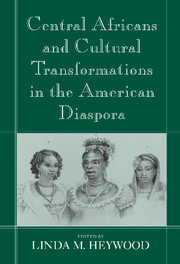Book contents
- Frontmatter
- Contents
- List of Contributors
- Foreword
- Acknowledgments
- Introduction
- PART ONE CENTRAL AFRICA: SOCIETY, CULTURE, AND THE SLAVE TRADE
- PART TWO CENTRAL AFRICANS IN BRAZIL
- PART THREE CENTRAL AFRICANS IN HAITI AND SPANISH AMERICA
- PART FOUR CENTRAL AFRICANS IN NORTH AMERICA AND THE CARIBBEAN
- 11 “Walk in the Feenda”: West-Central Africans and the Forest in the South Carolina–Georgia Lowcountry
- 12 Liberated Central Africans in Nineteenth-Century Guyana
- 13 Combat and the Crossing of the Kalunga
- Index
13 - Combat and the Crossing of the Kalunga
Published online by Cambridge University Press: 28 October 2009
- Frontmatter
- Contents
- List of Contributors
- Foreword
- Acknowledgments
- Introduction
- PART ONE CENTRAL AFRICA: SOCIETY, CULTURE, AND THE SLAVE TRADE
- PART TWO CENTRAL AFRICANS IN BRAZIL
- PART THREE CENTRAL AFRICANS IN HAITI AND SPANISH AMERICA
- PART FOUR CENTRAL AFRICANS IN NORTH AMERICA AND THE CARIBBEAN
- 11 “Walk in the Feenda”: West-Central Africans and the Forest in the South Carolina–Georgia Lowcountry
- 12 Liberated Central Africans in Nineteenth-Century Guyana
- 13 Combat and the Crossing of the Kalunga
- Index
Summary
This paper investigates the underexplored Central African contribution to New World culture in terms of martial arts and the spiritual underpinnings of their ritual practice. There is a growing body of literature on the martial art of capoeira Angola in Brazil, but being written in isolation from the wider world of capoeria's cognate and reflective forms in the Atlantic world, none has dealt with capoeira Angola's African background beyond speculation. In contrast, this current discussion will root itself in the combative and philosophical traditions of Central Africa and then look outward to Martinique, North America, and Brazil. This broad perspective is important for highlighting the fact that these arts were thriving even in places such as Virginia and Martinique where Central Africans did not constitute the dominant pluralities of the enslaved African population. In this light these martial arts are properly viewed not as residual by-products of the demographic clustering of Central Africans, nor as “retentions” or “memories” doomed to fade, but rather as living traditions that spread from enslaved Central Africans to other Africans and their descendants, and eventually even to people of European descent. During the dynamic spread of this martial art in the Americas, the central fighting system of the tradition remained remarkably constant in most areas while the practice rituals of the system were influenced by the dynamic religious practices they interacted with in the nineteenth and twentieth centuries.
- Type
- Chapter
- Information
- Publisher: Cambridge University PressPrint publication year: 2001



